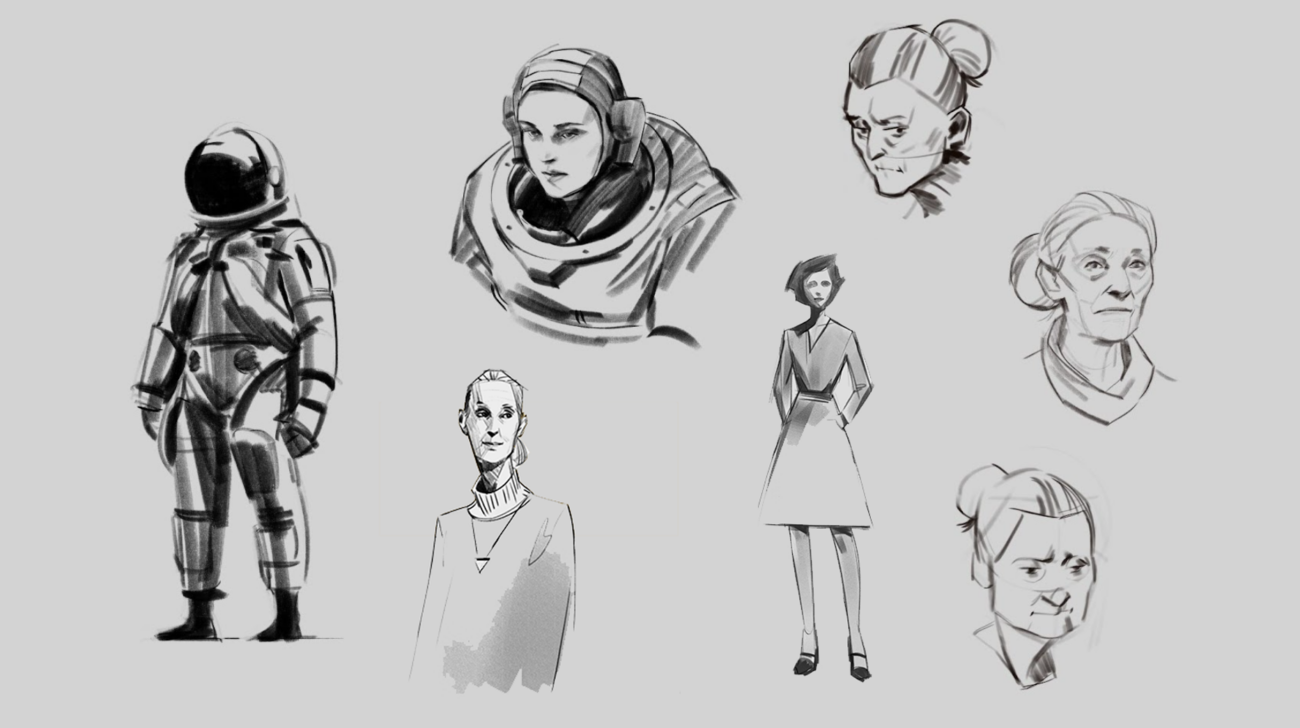Sundown
Journey through past, present + possibility in a last ditch flight to space.
Sundown is an artful, narrative-based game that explores memory, identity and relationships through the lens of a 93-year-old would-be astronaut living with dementia. Stepping into Mary’s slippers, you’ll shuffle out of the nursing home and into an impossible adventure between memory and make believe; a last ditch effort to finally get Mary to space.
You’ll relive memories from Mary’s past and experience vivid hallucinations of what might have been – each moment revealing new dimensions about who Mary is and where she’s been. And you’ll find that life might not be defined by your dreams – but by the relationships you make while chasing them.
An artful, playful exploration
IdeaSundown was born out of a belief that emotional engagement doesn’t require hours of gameplay, and that meaning doesn’t have to come at the expense of fun. It is a short, emotionally resonant exploration of how our memories shape the world, and the power of seeing each other for who we really are.
The success of games like Edith Finch and Florence show there is a market of gamers who don’t play often, but are yearning for artful, narrative-based games. There is also a lack of games appealing to women, who make up half of all gamers while only 6% of the games feature a female lead character.

Exploring past, present + possibility
CreativeWe make sense of the world through stories. Our memories are the stories we tell ourselves, serving as a roadmap for finding meaning as we move through life. But what if we couldn’t trust our memories? How would our stories, our very sense of self, change?
These are the driving questions of Sundown, an artful, narrative-based game that delves into the life of a driven and adventurous woman through the lens of her dementia. Players journey through landscapes of piecing together pieces of a life well-lived. And as they do, players are encouraged to question the line between truth and fiction – and whether distinguishing between the two truly matters, if meaning remains.
The search for fulfillment
ThemesSundown is about the human search for fulfilment. It is a story not just of self-discovery, but acceptance; an exploration of how we find meaning in ourselves, our lives, and our relationships. The game also explores the nature of identity through memory, asking what happens to us when our memories begin to fade. It invites us to consider what it means to make a difference in the world – and whether our impact on those we love, and the time we spend with them, might be the most meaningful legacy of all.

Driven by narrative
StoryMary was one of the exceptional female pilots who passed NASA’s astronaut screening tests back when the space race began. But, like the other female astronaut trainees of the day, Mary was never able to go on a mission. Those spots were reserved for men.

Years later, Mary is living in a dementia care home when a crashed space station mysteriously reappears in orbit – and transmits a message that calls Mary by name. This time, she’s determined that things will be different. She is going to space. And no one is going to stop her.

As the nursing home gradually transforms into a NASA mission control centre, you must find hidden packages, decipher signals and pass astronaut training. All while making your bed each morning and playing the odd game of bingo so busy bodies like Joan down the hall don’t catch on.

Shuffle and soar your way through moments of Mary’s life, piecing together forgotten dreams and fragmented relationships. And together you’ll discover that life might not be defined by our dreams – but by the relationships we make while chasing them.

Intriguing contradictions
ToneSundown is an atmospheric world of mystery and intrigue; a game full of contradictions, not afraid to lean into difficult topics and uncomfortable feelings. Yet it’s also a game full of humour, excitement and fun. An experience that takes players on a wild journey through the many diverse moods and emotions of a life well-lived. It’s a game that will make you laugh, maybe cry, and ultimately think about the complexities of who we are and who we could be.
Captivating aesthetic experience
Art DirectionWhile Sundown takes players on a journey of empathy and understanding, its visuals will offer a unique and captivating aesthetic experience perfectly paired to the story being not just being told, but experienced. Worlds are sometimes incomplete, with substantial areas of negative space, capturing the ephemeral, shifting nature of the human mind as it battles with dementia. But far from detracting from the experience, this minimalist aesthetic will enhance the game’s beauty – while also requiring fewer production resources and less performant devices for play.
Playful yet resonant
GameplayWe believe that it’s possible to create a game that doesn’t require hours and hours of gameplay to develop a strong emotional reaction within our players. Our goal is to offer a respite from the stresses and distractions of daily life. At the same time, we want to craft a short but emotionally resonant experience, prompting further thought and discussion.
Sundown is not a hard game. There’s not much to solve, no extensive reading or lengthy dialogue. It is a playful game that looks at life as a series of moments, lived and re-lived in different ways. The game is designed to remind players that there is more to life than directions and destinations; it’s about making the most of the moment you have before you.

Easy to access + enjoy
MechanicsThe mechanics of Sundown have been crafted with three main mechanics principles in mind: accessibility, mechanics as metaphor and immersion. These mechanics are short and easily accessible to everyone, with interactions that serve the narrative, and a story environment that immerses players in the game world. The game will also be released first on mobile, with the intention of making it accessible to a wider audience.

Stay in the loop
Subscribe to our newsletter to receive updates and insights about Sundown and other S1T2 projects.






















